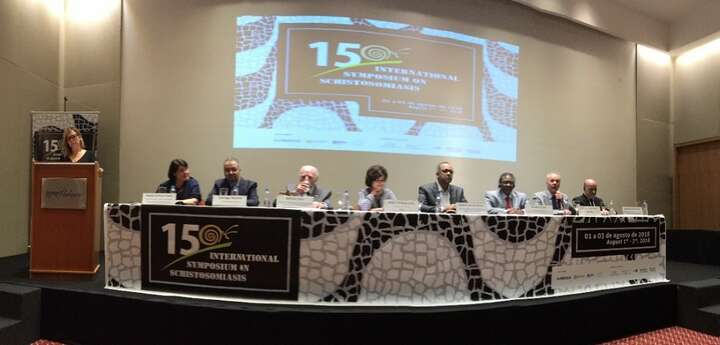
1st- 3rd August 2018
Professor Russ Stothard & Professor Louis Albert Tchuem-Tchuenté
The 15th International Symposium on Schistosomiasis was held in Brazil from 1st – 3rd August 2018. It is the longest running international meeting of its kind devoted to research and control of schistosomiasis. Originally established with a founding grant from the World Health Organization (WHO), the Symposium was first held in 1987. Since then, it has rotated across the various institutes of the FIOCRUZ Foundation with a significant portion of the scientific programme traditionally given over to international delegates, particularly those from Africa and China.
Presenting COUNTDOWN findings at this meeting offered an excellent opportunity for technical discussions and future research uptake. There were some 500 delegates attending this meeting with keynote and roundtable discussion presentations highlighting the state of the art.
Without doubt, the regularity of these symposia over the past 30 years has helped harmonise ongoing activities not only within Brazil but also across the Pan-American Health Organisation (PAHO) region. These also underpin and augment the activities of the Brazilian National Control Programme which has a broad global impact by influencing WHO policies and practices. For example, the standard diagnostic used for surveillance of intestinal schistosomiasis, the Kato-Katz method as used in COUNTDOWN studies, originated in Brazil with its inventor Professor Naftale Katz, honoured to be President of this 15th Symposium. Today, the national prevalence of infections with Schistosoma mansoni in Brazil has declined to below 2% in most endemic areas, with Brazil pioneering multi-sectoral approaches and interventions.
COUNTDOWN first presented at the 14th International Symposium held in Salvador in 2015. Since then, the programme has highlighted the burden of schistosomiasis in Africa and the need to scale-up treatment. COUNTDOWN has further helped to stimulate global interest on the needs of pre-school-aged children (PSAC) and has undertaken targeted interventions for this vulnerable group in Ghana and Cameroon. Professor Russell Stothard presented several COUNTDOWN activities and articles to share evidence and experiences. A key theme in this 15th Symposium was expanding access of praziquantel treatment to PSAC with an important update presented by the Paediatric Praziquantel Consortium. It is now estimated that up to 50 million African children will need this oral dispersible tablet formulation which will be available from 2021. A formal access plan, however, is yet to be developed but will most likely involve a not-for-profit donation model (the expected price per tablet is approximately 10 pence). COUNTDOWN studies in Ghana and Cameroon are helping to shape the future roll-out of this child-friendly medication.
Multisectoral actions are very much needed in Africa as illustrated in the Brazilian programme which is approaching disease elimination in several settings. However, certain high transmission hotspots remain a persistent factor in achieving elimination in both settings. These hotspots continue to challenge performance of currently used interventions, highlighting the need to change, adapt and revise intervention tactics. At the Symposium, tactics for schistosomiasis control were discussed not only in the Brazilian context but also the sub-Saharan Africa context. Experiences of COUNTDOWN in Cameroon were prime examples. Professor Tchuem-Tchuenté presented highlights from his recent paper in Infectious Diseases of Poverty explaining how components of the PHASE approach, as recently recommended by the TES Conference in Cameroon from last year, are best applied.
Just as Symposium participants were discussing disease hotspots or recalcitrant transmission foci, it was very timely that Prof Tchuem Tchuenté’s PLoS NTD paper on precision mapping, published that day. From broader discussions with other research groups and policy makers present at this Symposium, the importance of precision mapping gained approval, especially considering the Brazilian situation where resources need to be focused to attain local interruption of transmission.
We congratulate the 15th Symposium organisers, with special thanks to Dr Theresa Favre, for developing an exciting scientific programme. Furthermore, as research uptake is a continuous process, several of COUNTDOWN themes presented here on schistosomiasis, such as precision mapping, will be further discussed later in the year at COR-NTD and ASTMH, so watch this space!
